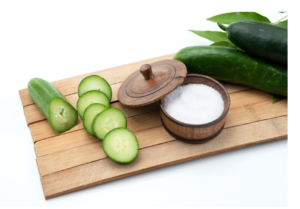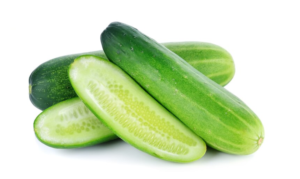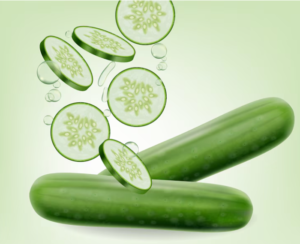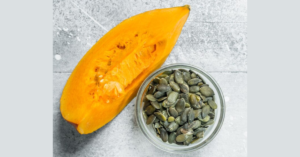Introduction
When it comes to healthy foods, cucumbers are often overlooked, yet they bring a wealth of benefits to your diet. Cucumbers can be easily added to meals. From salads to smoothies, and even cucumber-infused water, there are many ways to enjoy this refreshing vegetable. In this article, we’ll explore how adding more cucumbers can benefit your health and why they deserve a spot in your diet.
Table of Contents
Nutritional Profile of Cucumber
Cucumbers are low in calories but packed with vitamins, minerals, and hydrating water content. They’re especially rich in vitamin K, potassium, and antioxidants, all of which contribute to overall wellness.
1. Keeps You Hydrated
With their high water content (approximately 95%), cucumbers help to keep you hydrated throughout the day, especially in warmer climates or after exercise. Staying hydrated is essential for all bodily functions, from digestion to skin health.
2. Supports Weight Loss Goals
Because cucumbers are low in calories and high in fiber, they can help with weight management by promoting a feeling of fullness without extra calories.
3. Promotes Healthy Skin
Cucumbers contain antioxidants that support skin health by reducing inflammation and providing hydration. The vitamin C in cucumbers also promotes collagen production, which keeps skin firm and youthful.
4. Aids in Digestion
The fiber in cucumbers aids digestion by promoting regular bowel movements and helping to maintain a healthy gut environment. Regular cucumber consumption can relieve constipation and support a well-functioning digestive system.
5. Helps Reduce Blood Sugar Levels

Some studies suggest that cucumbers may help reduce blood sugar levels and improve glycemic control, making them a good choice for people managing their blood sugar.
6. Supports Heart Health
Cucumbers contain potassium and magnesium, two minerals linked to heart health. Potassium helps regulate blood pressure, while magnesium supports muscle and nerve functions, including heart muscles.
7. Acts as an Anti-Inflammatory
Cucumbers have phytonutrients that offer anti-inflammatory effects. These compounds help reduce inflammation throughout the body, which can help prevent chronic conditions like arthritis.
8. Helps Detoxify the Body
Cucumbers are a natural diuretic, which means they help your body flush out toxins by promoting urination. This cleansing effect helps keep your kidneys healthy and aids in removing waste, potentially reducing the risk of kidney stones. Detoxification supports many body systems and can leave you feeling refreshed.

9. Supports Bone Health
Cucumbers are rich in vitamin K, a key nutrient for bone health. Vitamin K assists in the production of proteins that regulate bone mineralization and helps maintain bone density, which is especially important as we age. Including cucumber in your diet could contribute to a stronger skeletal system, reducing the risk of fractures and osteoporosis.
10. Improves Eye Health
Cucumbers contain beta-carotene and antioxidants like lutein, which support eye health by protecting against age-related eye issues. Cucumber’s high water content also helps keep the eyes hydrated, which is crucial for maintaining overall eye comfort and clarity.
11. May Relieve Muscle Soreness
Cucumbers contain magnesium and potassium, which are essential for muscle recovery. Including cucumber in your post-exercise meal could help reduce muscle cramps and soreness, especially when combined with adequate hydration and rest.
12. Boosts Immune System

The antioxidants and essential vitamins in cucumbers, including vitamin C, support the immune system by fighting off free radicals and reducing oxidative stress. This helps your body ward off infections and illnesses, keeping you healthier overall.
Conclusion
Cucumbers are a versatile, nutritious addition to any diet. With their benefits for hydration, skin, heart health, and more, there’s every reason to include cucumbers in your meals. Adding more cucumber to your diet is an easy, effective way to boost overall health. With benefits ranging from hydration to immune support, there’s no doubt cucumbers are a nutritional powerhouse that can elevate your well-being.
Frequently Asked Questions (FAQ’s)
It is true that cucumbers contain antioxidants and hydrating properties that are beneficial to skin health.
Due to its low calorie and high fiber content, cucumber can aid in weight management.
Cucumber is over 95% water, making it an excellent hydrating food.
Yes, the fiber in cucumbers supports digestive health by promoting regular bowel movements.
Cucumbers contain potassium, which can help regulate blood pressure levels.
For freshness, cucumbers should be stored in a cool environment away from ethylene-producing fruits.
Studies suggest cucumbers may help with blood sugar regulation, making them a good choice for diabetes management.
Yes, cucumbers contain antioxidants that help reduce inflammation and support overall health.
A cucumber is a good source of vitamin K, as well as vitamin C and small amounts of B vitamins.
Cucumbers can be added to salads, sandwiches, smoothies, or even enjoyed as a refreshing snack.
Yes, due to its natural diuretic properties, cucumber helps cleanse the body by promoting urination, which assists in removing toxins.
Cucumbers are high in vitamin K, which plays a role in maintaining bone density and reducing the risk of osteoporosis.
Yes, cucumbers contain beta-carotene and antioxidants that help protect eye health and may reduce age-related vision issues.
Cucumber contains potassium and magnesium, which can help relieve muscle soreness and reduce cramping after exercise.
The antioxidants and vitamin C in cucumber bolster the immune system, helping to protect the body from illness.
Yes, cucumbers are safe and healthy to eat daily as part of a balanced diet, providing hydration, fiber, and essential nutrients.
Eating cucumbers raw, with the skin on, ensures you get the full range of nutrients, including fiber and vitamins.
Absolutely! Cucumber juice is hydrating, refreshing, and an easy way to consume essential vitamins and minerals.
Generally, cucumbers are safe, but if you’re on a diuretic medication, consult your doctor to avoid excessive urination.
If you’re looking for an easy, healthy snack that is quick and easy to prepare, try cucumber slices with hummus, cucumber salads, cucumber-infused water, or cucumber smoothies.

10 Proven Benefits of Bananas for Health and Well-being
Bananas are known for their natural sweetness, ease of peeling and rich nutrition. This makes them one of the most commonly consumed fruits in the world. Though bananas originated in Southeast Asia, they are now

Disease X: The Next Pandemic?
Emerging infectious diseases pose one of the greatest threats to human health and global stability. One of them, “Disease X” has intrigued scientists and WHO, as it represents the potential for an unknown disease to

The Remarkable Benefits of Eating Acorn Squash in Winter
Acorn squash has all the qualities that make it special. Winter calls for warmth, comfort, and nutrition, and acorn squash provides all of these. This vegetable is not just delicious but also has a lot

Omega-3 Fatty Acids
Omega-3 fatty acids play a very important role in the nutrients needed to maintain overall health. As people are getting to know about it, its popularity is increasing day-by-day. These fats play a very important



